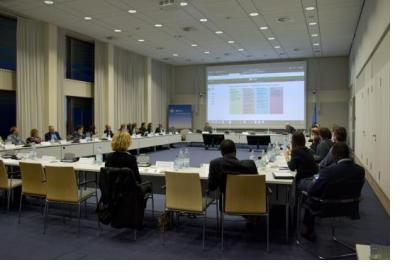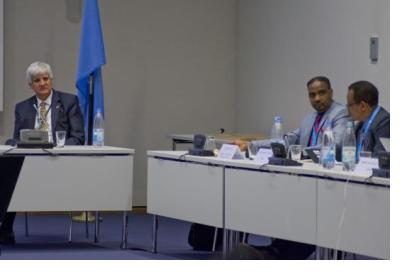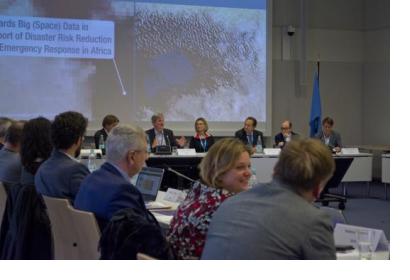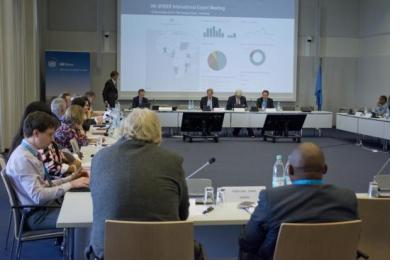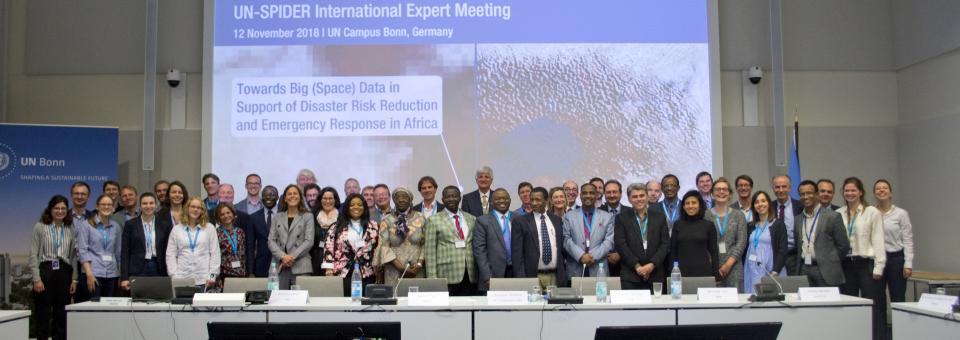The United Nations Office for Outer Space Affairs (UNOOSA), through its Platform for Space-based Information for Disaster Management and Emergency Response (UN-SPIDER), conducted an International Expert Meeting on 12 November at the UN Campus in Bonn, Germany. “Towards Big (Space) Data in Support of Disaster Risk Reduction and Emergency Response in Africa” aimed at contributing to an increased use of big data approaches and satellite technologies in African countries to respond to challenges posed by natural hazards.
The meeting was organized together with the German Aerospace Center (DLR) and in cooperation with the German Federal Ministry for Economic Affairs and Energy (BMWi). The Center for Remote Sensing of Land Surfaces (ZFL) at the University of Bonn, a UN-SPIDER Regional Support Office, also provided support to the meeting.
Presentations delivered at the expert meeting are available on the event page.
Disasters cause tremendous damage to societies around the world. They lead to loss of lives and property, displace people from their homes and destroy livelihoods, and disrupt sustainable development efforts worldwide. Developing countries are particularly susceptible to the impact of natural hazards as societies are more vulnerable and exposed, and less resilient to recover when disasters strike.
The 2030 Agenda for Sustainable Development and the Sendai Framework for Disaster Risk Reduction 2015-2030 highlight the interaction between sustainable development and disasters and call on stakeholders to “build the resilience of the poor and those in vulnerable situations and reduce their exposure and vulnerability to climate-related extreme events and other economic, social and environmental shocks and disasters.” This assessment is echoed by the 2004 Africa Regional Strategy for Disaster Risk Reduction, which guides efforts in this area on the continent and underlines that “disaster impacts have become an impediment to sustainable development in Africa”.
The ever-increasing availability and volume of data resulting from Earth observation satellites, social media, crowdsourced geographic information, virtual globes and ubiquitous web repositories, among other, can be analyzed and combined to generate insights into disaster risks and emergency situations and support evidence-based decision-making for emergencies and sustainable development.
The benefits of using big data approaches in synergy with space-based information for early warning, risk mapping and in disaster management have also been recognized in the Sendai Framework. The Sendai Framework calls for the use of satellite technologies, space-based information and big data applications at national and local levels as well as for regional and international cooperation to facilitate the use of such technologies. Space and big data technologies are already, and will be even more so in the future, important elements in early warning systems (EWS), which are central to effective disaster preparedness and feature prominently in the Sendai Framework as well as in the Paris Agreement.
The UN-SPIDER International Expert Meeting addressed these topics by bringing together around 45 experts from space agencies, civil protection authorities, development cooperation actors, international organizations, technical relief and humanitarian aid providers, national ministries and the private sector. More specifically, it aimed to:
Take stock of the recent developments in the implementation of the Sendai framework related to big data and space technology applications as well as in international networks such as the Global Partnership Using Space-based Technology Applications in Disaster Risk Reduction (GP- STAR), the data science and analytics networks as well as the International Network on Multi-Hazard Early Warning Systems (IN-MHEWS).
Engage experts and institutional partners in Germany and Europe which can accompany UN-SPIDER in strengthening the capacity of governments and stakeholders in Africa in making use of big data and satellite technologies in risk and disaster management.
Identify relevant development and training needs of African partners to formulate strategies for technical advisory support to African countries upon demand and in line with the Africa Space Policy and UN-SPIDER’s mandate.
Raise awareness amongst participants of opportunities offered by the space community to use the latter’s expertise and resources in risk and disaster management as a whole.
The outcomes, results and key recommendations of this International Expert Meeting will be published as a technical report and will be incorporated into the UN-SPIDER plan of work for the coming years.
| Attachment | Tamaño |
|---|---|
| Agenda - UN-SPIDER International Expert Meeting, 12 November 2018, Bonn, Germany (685.52 KB) | 685.52 KB |
